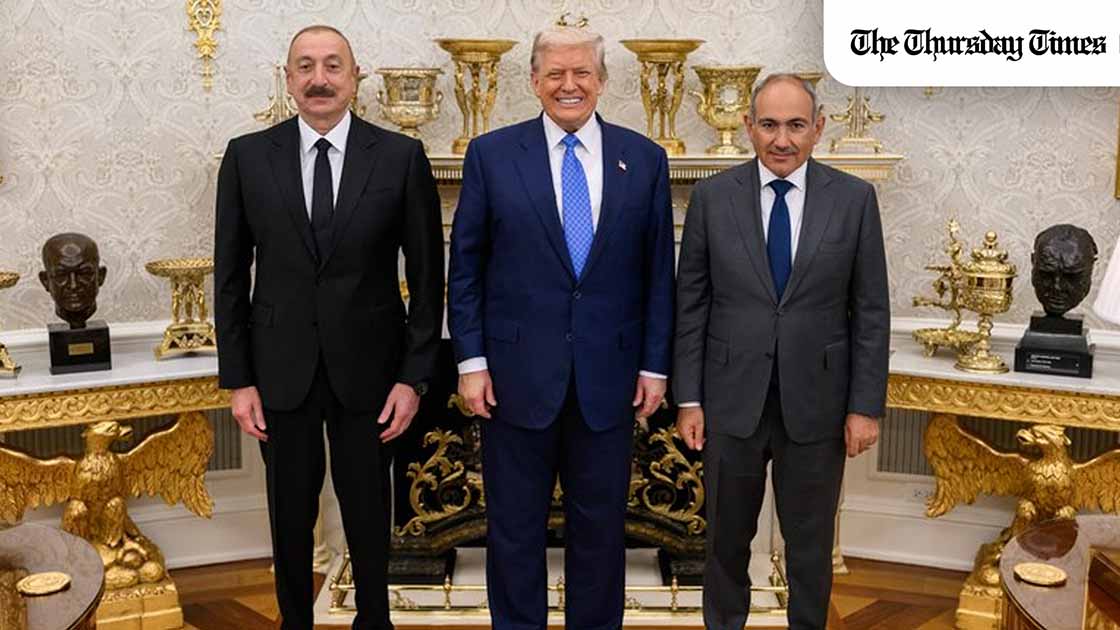TLDR:
• Armenia and Azerbaijan sign historic deal
• Trump nominated jointly for Nobel Prize
• Peace corridor set to reshape region
WASHINGTON (The Thursday Times) — In a quietly surreal scene at the White House, two bitter rivals — Armenia and Azerbaijan — sealed what could become one of the most consequential diplomatic resets of the decade, shaking hands in front of President Donald Trump and agreeing to a permanent end to decades of hostility. With the ink barely dry, both countries made an unusual move: jointly nominating Trump for the Nobel Peace Prize.
US President Donald Trump makes historic announcement of permanent ceasefire between Azerbaijan and Armenia in presence of both leaders.
Both countries have pledged to end hostilities forever, restore trade, travel and diplomatic ties, and uphold each other’s sovereignty and… pic.twitter.com/x8QkDqeybV— The Thursday Times (@thursday_times) August 8, 2025
Historic ceasefire and new terms
The accord is being described by American officials as a full cessation of armed conflict between Armenia and Azerbaijan. It represents the most ambitious attempt yet to settle tensions that have festered since the Nagorno-Karabakh wars. Under the new framework, both sides have agreed to respect one another’s sovereignty, open trade routes, establish diplomatic ties, and collaborate on border integrity.
But the real shock came not from the ceasefire itself — which has been attempted in various forms over the years — but from the sudden willingness of both parties to sideline other international mediators, particularly the Russian-backed OSCE Minsk Group, in favour of a wholly US-led initiative.
Corridor of influence
A key component of the deal is the opening of a transit route linking mainland Azerbaijan to its Nakhchivan exclave through Armenia’s Syunik province. It is being dubbed the “Trump Corridor” by regional analysts, a nod both to the man who brokered the deal and to the symbolic rebalancing of power away from Russian and Iranian influence in the region.
This route, although commercial on the surface, represents a long-term strategic foothold for the US. It not only allows Azerbaijan direct access to Turkey but also provides the US a legitimate economic and security presence in a geography it has historically had little leverage over.
Nobel nomination announced
Soon after the agreement was signed, Armenian Prime Minister Nikol Pashinyan and Azerbaijani President Ilham Aliyev announced they would jointly nominate Trump for the Nobel Peace Prize. It’s a move laden with irony, given Trump’s deeply divisive global reputation and previous failed bids for the honour.
I agree with Armenian Prime Minister Pashinyan that we should send a joint appeal to the Nobel Committee to award President Trump the Nobel Peace Prize. President Trump has performed a miracle in just six months — President of Azerbaijan, Ilham Aliyev pic.twitter.com/LFcwMlwCiH
— The Thursday Times (@thursday_times) August 8, 2025
Yet in this case, both leaders appear to genuinely attribute the breakthrough to his direct intervention, private negotiations, and unconventional style. Their statement was made at the White House, without typical ceremony — no red carpets or dramatic press theatrics — just a quiet announcement that the unlikeliest of diplomatic outcomes had, somehow, materialised.
Adding to the momentum, Pakistan has also submitted a formal nomination for President Trump to receive the Nobel Peace Prize. Islamabad credits his intervention in diffusing a recent high-stakes military standoff with India, where his shuttle diplomacy led to a surprise ceasefire and withdrawal of forces on both sides. The move marks a rare trilateral alignment of endorsements from countries with vastly different strategic interests — all converging around a single diplomatic actor.





